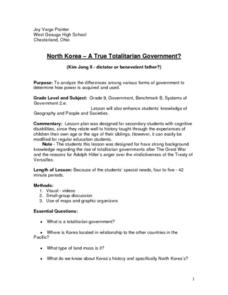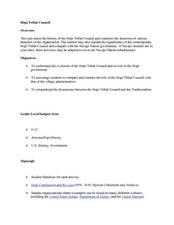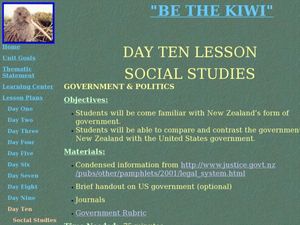Curated OER
Government: Balance of Power
Fifth graders conduct Internet research about the governmental balance of power. They create Kidspiration projects demonstrating the workings of the three branches of government. They compare U.S. democracy with other forms of government.
Los Angeles Unified School District
Capitalism and Socialism
Capitalism, socialism, communism ... these may seem like a whole bunch of isms to your scholars. High schoolers won't confuse them after completing an informative resource. Your class masters how to use primary sources to critically...
Teaching Tolerance
Mass Incarceration as a Form of Racialized Social Control
Mass incarceration: A result of a tough stance on crime or racial discrimination, you decide. Academics explore the history and reasons behind mass incarcerations in the United States and its impact on ethnic communities. The...
Curated OER
Who's The Boss?
Upper elementary and middle schoolers research and analyze some different types of governments. Democracies, Monarchies, and Dictatorships are some of the types that are looked at. Learners use the Internet to gather information that...
Curated OER
Comparing Utah's Past and Present Government
Fourth graders research the past and present forms of government in Utah. In this government studies lesson students analyzes different forms of government and work with a group to gather information about how Utah was/is run and then...
Curated OER
Government Lesson Plan: Lesson Plan 12
Students investigate various political systems around the world. They complete a chart that compares the U.S. political system with other nations' governments, conduct research on a selected nation, and present an oral report.
Curated OER
North Korea-A True Totalitarian Government
Ninth graders analyze the differences among various forms of government to determine how power is acquired and used. They need to have a strong background regarding the rise of totalitarian governments after The Great War and the...
Curated OER
Why Do Governments Exist? Locke, Hobbes, Montesquieu, and Rousseau
Here is a great secondary source reading that includes the primary ideas and philosophies of the famed Enlightenment philosophers: Thomas Hobbes, John Locke, Charles Montesquieu, and Jean-Jacques Rousseau. In additional to discussing...
Museum of Tolerance
Citizenship Then and Now: Comparing Ancient Rome and Contemporary American Society
Class members research citizenship in Ancient Rome and in the United States and use the provided graphic organizers to compare the rights and responsibilities of citizens in these two democracies.
Curated OER
The Three Branches of Government
Students complete a unit on the three branches of government. They compare/contrast the three branches of government, write a letter or e-mail to an executive in the Federal Government, and develop outlines for historical documents.
Curated OER
Redistricting: Drawing the Lines
Difficult redistricting concepts are covered in a context that will make it understandable to your government scholars. They begin with a KWL on the term redistricting and then watch a video to answer some questions. They analyze...
Curated OER
Differing Federal Responses to the Great Depression: Letter Analysis
Young analysts examine two letters, one written by President Hoover and one written by FDR. Each letter contains that president's response to the role of the Federal Government during times of crisis (The Great Depression). They analyze...
Curated OER
Alexander Hamilton and the Roots of Federalism
Explore the origin of political parties in the United States. Learners work in groups to read and analyze copies of the "Report on Manufactures" written by Alexander Hamilton. Then, they complete a worksheet comparing the Federalists to...
Curated OER
Lesson 6: Crowded Skies
This is a treasure-trove of multimedia resources to help your scholars analyze transportation methods. They discuss different forms of movement, utilizing several infographics to spur conversation deeper and get visual learners engaged....
Curated OER
Compare the United States Government with Other Political Systems
Students explore the U.S. form of government and illustrate other forms of government found throughout the world. They explain the similarities and differences between the U.S and other governments.
School Improvement in Maryland
Political Systems: Advantages and Disadvantages
Every political system has advantages and disadvantages. To gain an understanding of these differences, groups investigate the political system of another country—oligarchy, monarchy, dictatorship, parliamentary—and prepare a...
Curated OER
Critical Thinking About Government
Students research the Comox Band's system of government and report on what kind of government they think would work for them. In this government lesson plan, students decide between a hereditary system or an election system of...
Curated OER
Hopi Tribal Council
Focusing on the differences between traditional Hopi government and the Hopi Tribal Council, this resource is a good addition to your unit on Native American culture. Learners conduct Internet research, analyze primary source photos, and...
Curated OER
Government
Second graders run for various offices. They dress up like a politician, pretend to be running for an office, and tell the students why they should vote for him/her. They explain why it is necessary for a community to have a government
Curated OER
Is Gulf War Syndrome a Significant Health Issue the U.S. Government has Tried to Cover Up?
Students examine the issues surrounding Gulf War Syndrome. In groups, they analyze evidence from the war and medical information. They participate in a debate in which they support their feelings on whether the government of the United...
Curated OER
Be the Kiwi: Government and Politics in New Zealand
Students examine the structure of government in New Zealand. In this government lesson, students listen their instructor present information about the government in New Zealand then create diagrams that compare its structure to the...
Infobased Learning
Bloom's Literature: How to Write about Nineteen Eighty Four
A good prompt is hard to find, especially ones that encourage application, analysis, synthesis, and evaluation of a text. Help is here in the form of a prompt list for George Orwell's Nineteen Eighty Four that offers essay topics that...
Curated OER
Analyzing Primary and Secondary Sources to Assess the Decisions and Policies of Sitting Bull, Red Cloud, and the U.S. Government
Students examine U.S. policies regarding Native Americans. In this Native American history lesson, students analyze provided primary and secondary sources concerning Red Cloud, Sitting Bull, and the Dawes Act. Students use the provided...
Curated OER
Linear Modelling of the Life Expectancy of Canadians
Middle and high schoolers explore the concept of linear modelling. In this linear modelling lesson plan, pupils find the line of best fit for life expectancy data of Canadians. They compare life expectancies of men and women, and find...

























